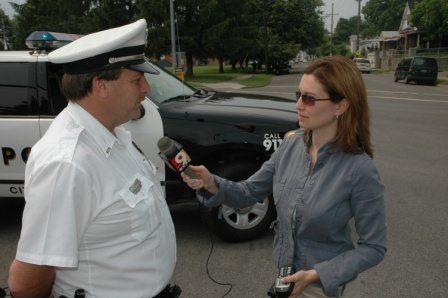A Guide to "Cop Talk"
Law enforcement definitely has a language all its own, and without a translator civilians can sometimes feel left out of the conversation. Here are a few simple terms worth remembering.
Affidavit: Written statement of facts given under oath.
AKA: Also Known As. “His name is Sam Smith, AKA Slick Sammy.”
BAC: Blood Alcohol Content. “Man, that guy was way past drunk. His BAC was .27.”
BOLO: Be On The Lookout. “Yes, Sir. We issued a BOLO for the robbers and their car. Hopefully, an officer will have them in custody soon.”
*APB is an outdated term/acronym that has been replaced by BOLO.
Bond: Money or other security posted with the court to guarantee an appearance.
CI: Confidential informant.
City: Refers to officers who work for city police departments. “The city will handle that case.” The same is true for county and state.
Civil Case: Private lawsuit, not one brought by the state.
Complaint: Statement given under oath where someone accuses another person of a crime. Officers may also refer to a call as a complaint. “Man, I caught two loud music complaints in one hour last night.”
Complainant: Person who accuses another. Or, someone who called the police. “Go to 1313 Mockingbird Lane. The complainant’s name is Herman Munster.”
Cook: Make/manufacture crack cocaine or methamphetamine.
Cooker: Person who manufactures crack cocaine or methamphetamine.
Drive Off: Person who left gas station without paying for fuel. “Unit 2023. Respond to Sally Sue’s Convenience Store. Report of a drive off. Suspect operating a 1964 Blue Rambler.”
ERT: Emergency Response Team.
Hit: Outstanding warrant, or stolen. “We got a hit on that car. It was stolen last night from the lot of Cheap and Totally Junk Used Cars.”
Hook ’em Up: To handcuff a prisoner.
Hot: Stolen.
Information: Paperwork (document) filed by a prosecutor that accuses someone of a crime.
Keyholder: Someone—manager/owner, etc.— who has the keys to a building. “10-4, the alarm is still sounding but all appears to be well. No signs of a break-in. Call the keyholder and have them meet me here so I can take a look inside.”
Knock and Announce: Requirement that officers knock on the door and announce their presence when serving a search warrant. “Police! Search warrant!”
LT: Lieutenant.
OIC: Officer in charge. “Lieutenant A. Hole is OIC tonight. There’ll be no goofing off on this shift.”
PC: Probable cause. “Do you have PC to get a warrant?”
PIT Maneuver: Pursuit Intervention Technique (Attendees of the 2015 Writers’ Police Academy will have the opportunity to experience the PIT maneuver first-hand, while inside the cars during the performance of the technique).
Plastic: Credit card.
POST: Police Officer Standards and Training.
Priors: Previous arrests.
Ride the Chair: Die by electrocution.
Ride the Needle: Die by lethal injection.
Roll Up: Arrest someone.
Sally Port: A secure area—behind gates, doors, walls, etc.—at a police station, jail, or prison where prisoners are safely transferred from vehicles to the facility. Typically, a police vehicle drives inside the sally port where doors or gates are closed and locked behind them before prisoners are allowed to exit.
SORT: Specialized Operation Response Team
Stripes: Sergeant’s patch or insignia. (Three stripes indicates the rank of sergeant).
Strong-Arm Robbery: A suspect takes property, by force, threat, and/or intimidation, from another person without the use of a weapon.
T-Bone: Broadsided in an crash.
Verbal: A warning. “I gave him a verbal, but next time his butt’s going to jail.”
Visual: Able to see something or someone. “Have you got a visual?”
UC: Undercover officer.
Walk: To get off a charge. Released without a record.
Write – Issue a summons.
“Did you write him?”
“Yep. 87 in a 55.”
VIN – Vehicle Identification number. “Run the VIN on that car to see if you get a hit.”





